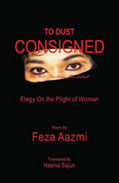"Stands the woman of today
In a desolate wilderness
Free she is, but
Still remains captive."

 |
To Dust Consigned by Feza Aazmi Trafford Publishing
book review by Dylan Ward
Reading Fera Aazmi's poem is like walking through a long shadow of history as you peer cautiously over your shoulder at what once was and is, while pressing onward to search for a more hopeful future somewhere in a dim light ahead. At times dark and disturbing, but not altogether dismal, Aazmi lays bare the dangerous and sometimes deadly plight of being a woman throughout history and even today. He delves deep into the psyche of man and highlights the inequality and suppression of minorities, which he demonstrates is pervasive within all cultures.
The poem is written almost like a text for learning. It is broken into sections of Lessons (1-14) with each subtitle pertaining to the message therein. In Lesson 7: The Mirage of the West, Aazmi speaks the tug-of-war pressure on modern-day women to conform to societal expectation.
Her personality is split
In two spheres as diverse
On one side she gets ensnared
In challenges of the job
Among people spiteful
On the other hand the child
Cries for affection (143.1-7)
Many of the lessons focus on the victimization of women, especially during days of witch trials and public burnings. This cries of organized religion against alleged sins of humanity. Many of these are graphic, such as in Lesson 5: The Dance of Death.
In morbid desperation they
Found in woman an easy prey
To put her on the cross
She was tied and beaten
Dragged her on the stony mass
Stakes and gibbets were erected
That struck terror in every soul
Scorched her on blazing coal (71.1-8)
While it may be difficult and gruesome to envision such torture enacted upon anyone, not all is bleak in the poem. Aazmi also gives the reader glimmers of hope of a better, more enlightened world. In Lesson 13: In the Name of Ultimate Justice he writes:
A world in which
All human beings
Are equal
No one inferior
None superior (253.1-5)
Eloquently translated by Hasina Sajun, the poem is also dedicated to a woman named Mukhtaran Mai, who was victimized near the village of Meerwala. It is an appropriate dedication and is a reminder of not just her, but all victims who have suffered. This is a poem that grabs the reader's attention and asks to confront harsh realities. It's written as a testament of an unrighteous world and a call to end discrimination and gender superiority.